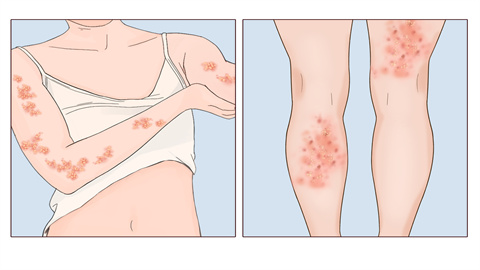What causes herpes zoster?
Cold sores, medically known as herpes zoster, generally may be caused by aging, insufficient sleep, long-term use of glucocorticoids, viral colds, chronic kidney disease, and other factors. If discomfort symptoms appear, it is recommended to seek timely treatment at a regular hospital. Detailed analysis is as follows:
1. Aging
With increasing age, the function of human immune organs gradually declines, immune cell activity decreases, and the ability to clear varicella-zoster virus weakens. The virus latent in the ganglia can be easily activated, thus triggering herpes zoster. In daily life, one should insist on moderate exercise every day, such as walking or doing senior gymnastics, to enhance body immunity.
2. Insufficient Sleep
Long-term lack of sleep duration or poor sleep quality can disrupt the immune rhythm of the body, leading to reduced production of immune cells and decreased resistance to varicella-zoster virus, thereby increasing the risk of developing herpes zoster. It is important to develop a regular sleep habit, going to bed and waking up at a fixed time daily, ensuring 7-8 hours of sleep each day.

3. Long-term Use of Glucocorticoids
Long-term use of glucocorticoids such as prednisone tablets, methylprednisolone tablets, and dexamethasone tablets can suppress the human immune response, reduce the immune system's monitoring capability against varicella-zoster virus, and allow latent viruses to be activated, causing herpes zoster. If symptoms related to herpes zoster appear due to medication, inform the doctor immediately and adjust the medication under medical guidance. Depending on the condition, the dosage may be reduced or the medication changed; do not adjust the medication by yourself.
4. Viral Cold
During a viral cold, viruses multiply extensively in the body, consuming immune resources and weakening the immune system's defense against varicella-zoster virus. Latent viruses can then proliferate and spread, causing herpes zoster, often accompanied by symptoms such as fever, headache, and nasal congestion. If symptoms are obvious, medication such as oseltamivir phosphate capsules, ribavirin granules, and compound cold medicine may be used under a doctor's guidance.
5. Chronic Kidney Disease
Patients with chronic kidney disease have impaired kidney function, which prevents timely elimination of metabolic waste from the body, affecting the generation and function of immune cells, leading to decreased immunity. This makes the body susceptible to varicella-zoster virus infection, inducing herpes zoster, and recovery tends to be relatively slow. Patients may follow medical advice to use medications such as uremic clearance granules, kidney failure relief tablets, and Bailing capsules.
In daily life, attention should be paid to personal hygiene, frequent handwashing, and avoiding contact with herpes zoster patients; adjust clothing according to seasonal changes to prevent colds; and appropriately participate in physical exercise to strengthen physical fitness.








